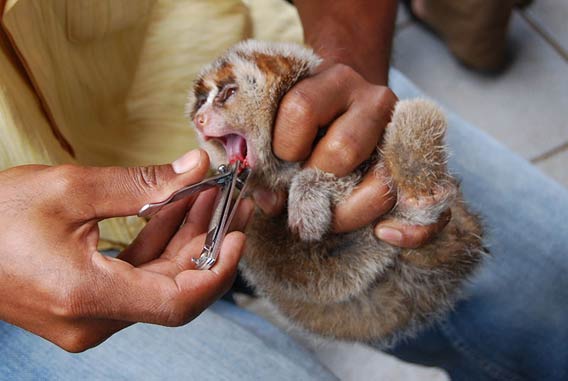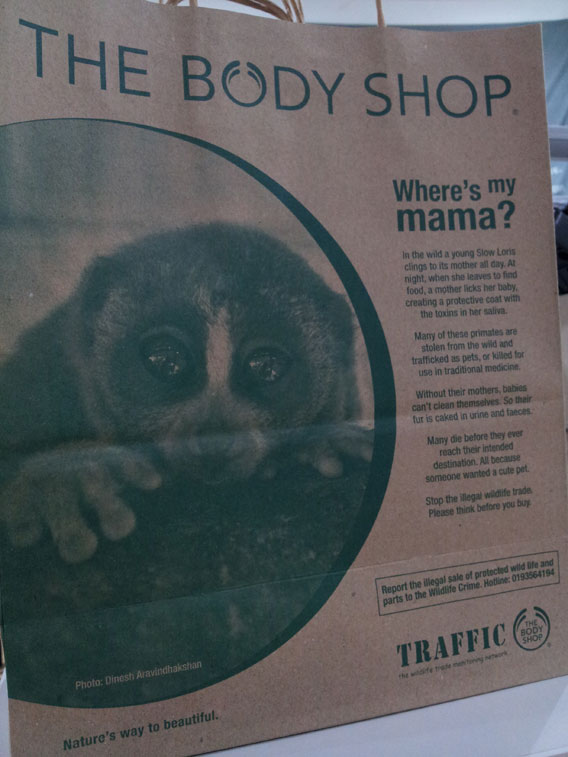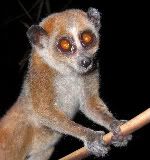
Slow lorises like this Sunda Slow Loris juvenile (Nycticebus coucang) have their teeth forcibly removed by animal traffickers in the open-air bird markets of Indonesia. The practice is done to either convince buyers that the animal is suitable as a child’s pet or to make people think the animal is an infant. This photo was taken by Dr. Karmele Llano Sánchez of the International Animal Rescue (IAR).
A new campaign by The Body Shop West Malaysia and TRAFFIC Southeast Asia attempts to raise awareness of the illegal slow loris pet trade. YouTube videos of “cute” pet slow lorises have raised demand for these endangered primates, but as the campaign highlights the pet trade is fueling slow loris deaths in the wild and cruel treatment, such as pulling out their teeth, to make them more desirable pets.
Hunters steal slow loris babies from the wild, often killing their mothers in the process. Infants are then transported in sacks, sometimes several in one sack with their arms tied, or in wire cages, which cut their skin. Before being sold in a market, their teeth are pulled out with pliers to make them more palatable for consumers. The operation, done without anesthetic, can lead to infection and death.
Dr. Anna Nekaris, an anthropologist who specializes in slow-loris research at Oxford Brookes University, told mongabay.com in 2009 that it’s estimated 30-90 percent of captured slow lorises don’t survive the stress of being stolen from the wild.
Because they are wild animals, slow lorises were never meant to be pets. Slow loris young are unable to clean themselves and become caked with feces and urine. In the wild, their mothers clean them.
In addition, Nekaris says that “Most captive lorises are fed an inappropriate diet which leads to tooth decay, diabetes, obesity, kidney failure, and death.”
Pet traders will often tell customers that their slow lorises were not taken from the wild, but bred in a pet facility. Nekaris says this is likely a lie.
“Even the best breeding facilities have great difficulty breeding lorises, and those that do often have difficulty keeping them alive. It is so easy to get access to wild-caught lorises, it is highly doubtful that a seller who claims to have captive-bred ones is telling the truth.”
The TRAFFIC and Body Shop campaign is the second in a series that focused first on orangutans and tigers. The current campaign also highlights the plight of the Tokay gecko, which is erroneously believed to cure AIDS.
Along with deforestation and consuming slow loris parts for traditional medicine, the pet trade is pushing loris populations to the edge of extinction. All five species of slow loris are considered imperiled with four listed by the IUCN Red List as Vulnerable to extinction, and one, the Javan slow loris, listed as Endangered.

TRAFFIC and The Body Shop slow loris campaign for peninsular Malaysia. Click to enlarge.
Related articles
YouTube videos may be imperiling cuddly primate

(02/24/2009) Many “cute” and “cuddly” species have gained attention and funds from conservation groups, since the public gravitates toward such attractive species. In fact, cuteness can sometimes mean the difference between conservation attention and extinction. However, for slow lorises being cute may be their downfall. Despite the fact that owning a slow loris as a pet or trading it is illegal in all range countries and “all countries where primates as pets are illegal,” the species is still heavily trafficked, says Dr. Anna Nekaris, an anthropologist who specializes in slow-loris research at Oxford Brookes University. During the past few years videos of pet slow lorises have begun to appear on YouTube. Such videos often include comments from users who push misinformation about the slow loris’s legality and aptitude as pets, raising concerns among conservationists that the videos encourage people to actively pursue the slow loris as a pet.
(06/11/2007) CITES delegates agreed to a total ban on trade in the slow loris, a Southeast Asian primate commonly trafficked for the pet trade. Environmental groups welcomed the move.
Cuddly slow loris threatened by the pet trade
(05/09/2007) The slow loris, a big-eyed primate found in the rainforests of southeast Asia, is threatened by the international pet trade said ProFauna Indonesia, a wildlife activist group that has called for a ban on the illegal trafficking of the charismatic animal.